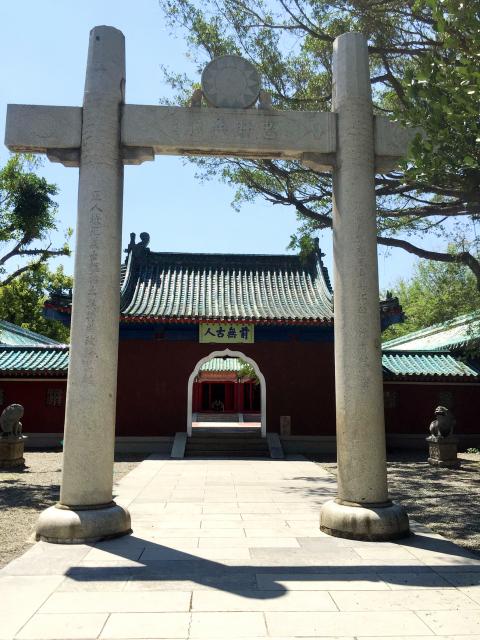The Tainan City Government should remove the Chinese Nationalist Party (KMT) emblem from a gate at the Koxinga Shrine, Democratic Progressive Party (DPP) Tainan City Councilor Lee Wen-cheng (李文正) said.
“The city government should remove the party emblem as soon as possible to protect this historical architecture from political pollution,” Lee said.
The emblem was added to the gate in 1947 on the order of then-minister of national defense Pai Chun-hsi (白崇禧), who also ordered his own name to be inscribed on the gate’s pillars and shrine’s inscription board, when he visited the site following the 228 Massacre.

Photo: Tsai Wen-chu, Taipei Times
Lee said he called for the removal of the KMT emblem from the shrine during the tenure of former Tainan mayor Hsu Tain-tsair (許添財), but the then-members of Tainan’s Historical Records Committee rejected the call by a vote of nine to six and instead erected a sign near the monument, a result Lee called “deeply disappointing.”
However, as the nation is poised to have its third transfer of power following the DPP’s victory in the Jan. 16 presidential election, the calls for transitional justice by Taiwanese “can be heard from the heavens,” Lee said, adding that the time to remove the “ridiculously inappropriate” emblem has arrived.
“A democratic nation like Taiwan must get rid of symbols of dictatorship, like the statues of Chiang Kai-shek (蔣介石) that are being torn down. If the government cannot achieve something as simple as this, how can the public have any faith in transitional justice?” Lee said.
The Tainan Cultural Affairs Bureau said that the shrine was registered as a historic landmark in 2010 and modifications to the site are possible through a cultural heritage assessment process.
Although the KMT emblem on the gate had been called into question in 2009, the committee at the time decided to keep the emblem and the inscriptions and put up a sign near the monument to explain its history, the bureau said.
The explanatory text — written in Chinese, Japanese and English — states that the monument was altered during the authoritarian period because the government lacked respect for historical sites and that the changes were kept by the city government as a warning to visitors to safeguard Taiwanese democracy, the bureau said.
The bureau said it respects the committee’s decision, but added that if the message is considered to be unclear, it could edit the text to emphasize it.

An essay competition jointly organized by a local writing society and a publisher affiliated with the Chinese Communist Party (CCP) might have contravened the Act Governing Relations Between the People of the Taiwan Area and the Mainland Area (臺灣地區與大陸地區人民關係條例), the Mainland Affairs Council (MAC) said on Thursday. “In this case, the partner organization is clearly an agency under the CCP’s Fujian Provincial Committee,” MAC Deputy Minister and spokesperson Liang Wen-chieh (梁文傑) said at a news briefing in Taipei. “It also involves bringing Taiwanese students to China with all-expenses-paid arrangements to attend award ceremonies and camps,” Liang said. Those two “characteristics” are typically sufficient

A magnitude 5.9 earthquake that struck about 33km off the coast of Hualien City was the "main shock" in a series of quakes in the area, with aftershocks expected over the next three days, the Central Weather Administration (CWA) said yesterday. Prior to the magnitude 5.9 quake shaking most of Taiwan at 6:53pm yesterday, six other earthquakes stronger than a magnitude of 4, starting with a magnitude 5.5 quake at 6:09pm, occurred in the area. CWA Seismological Center Director Wu Chien-fu (吳健富) confirmed that the quakes were all part of the same series and that the magnitude 5.5 temblor was

The brilliant blue waters, thick foliage and bucolic atmosphere on this seemingly idyllic archipelago deep in the Pacific Ocean belie the key role it now plays in a titanic geopolitical struggle. Palau is again on the front line as China, and the US and its allies prepare their forces in an intensifying contest for control over the Asia-Pacific region. The democratic nation of just 17,000 people hosts US-controlled airstrips and soon-to-be-completed radar installations that the US military describes as “critical” to monitoring vast swathes of water and airspace. It is also a key piece of the second island chain, a string of

The Central Weather Administration has issued a heat alert for southeastern Taiwan, warning of temperatures as high as 36°C today, while alerting some coastal areas of strong winds later in the day. Kaohsiung’s Neimen District (內門) and Pingtung County’s Neipu Township (內埔) are under an orange heat alert, which warns of temperatures as high as 36°C for three consecutive days, the CWA said, citing southwest winds. The heat would also extend to Tainan’s Nansi (楠西) and Yujing (玉井) districts, as well as Pingtung’s Gaoshu (高樹), Yanpu (鹽埔) and Majia (瑪家) townships, it said, forecasting highs of up to 36°C in those areas